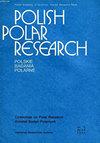基于高分辨率卫星数据的2003-2017年喀拉海海冰状况
IF 0.8
4区 地球科学
Q4 ECOLOGY
引用次数: 1
摘要
基于2003 - 2017年高分辨率遥感数据库,对喀拉海近期冰况变化进行了描述和量化。总的来说,喀拉海在冬季完全被较厚的海冰覆盖,但在夏季海冰覆盖不断减少。2003年是冰情最严重的一年,而2012年和2016年是最不严重的一年。广阔的海冰在5月前开始融化,并在12月底再次完全冻结。冰融化的时间大约是冻结时间的两倍。自2007年以来,最小冰覆盖率一直低于5%,导致夏季宽阔的开放水域。在此基础上,定量计算和分析了大气外强迫对冰情的局部驱动因子。冬季地表积温对冬季的冰浓度和厚度状况以及随后融冻阶段的冰覆盖指数起着主要作用。冬季积温与冰厚距平指数、冰覆盖距平指数、融冻期持续时间的相关系数分别接近-0.72、-0.83和0.80。夏季经向风对夏季冰覆盖异常指数贡献较大,相关系数在2007年和2010年分别超过0.80和0.90。本文章由计算机程序翻译,如有差异,请以英文原文为准。
Sea ice regime in the Kara Sea during 2003–2017 based on high-resolution satellite data
In this paper, the recent ice regime variations in the Kara Sea have been described and quantified based on the high-resolution remote sensing database from 2003 to 2017. In general, the Kara Sea is fully covered with thicker sea ice in winter, but sea ice cover is continuously declining during the summer. The year 2003 was the year with the most severe ice conditions, while 2012 and 2016 were the least severe. The extensive sea ice begins to break up before May and becomes completely frozen at the end of December again. The duration of ice melting is approximately twice than that of the freezing. Since 2007, the minimum ice coverage has always been below 5%, resulting in wide open-waters in summer. Furthermore, the relevant local driving factors of external atmospheric forcing on ice conditions have been quantitatively calculated and analyzed. Winter accumulated surface air temperature has been playing a primary role on the ice concentration and thickness condition in winter and determining ice coverage index in the following melt-freeze stage. Correlation coefficients between winter accumulated temperature and ice thickness anomaly index, the ice coverage anomaly index, duration of melt-freeze stage can approach -0.72, -0.83 and 0.80, respectively. In summer, meridional winds contribute closely to summer ice coverage anomaly index, with correlation coefficient exceeding 0.80 since 2007 and 0.90 since 2010.
求助全文
通过发布文献求助,成功后即可免费获取论文全文。
去求助
来源期刊

Polish Polar Research
ECOLOGY-GEOSCIENCES, MULTIDISCIPLINARY
CiteScore
2.00
自引率
7.70%
发文量
0
审稿时长
>12 weeks
期刊介绍:
The quarterly Polish Polar Research edited by the Committee on Polar Research of the Polish Academy of Sciences is an international journal publishing original research articles presenting the results of studies carried out in polar regions.
All papers are peer-reviewed and published in English.
The Editorial Advisory Board includes renowned scientist from Poland and from abroad.
 求助内容:
求助内容: 应助结果提醒方式:
应助结果提醒方式:


